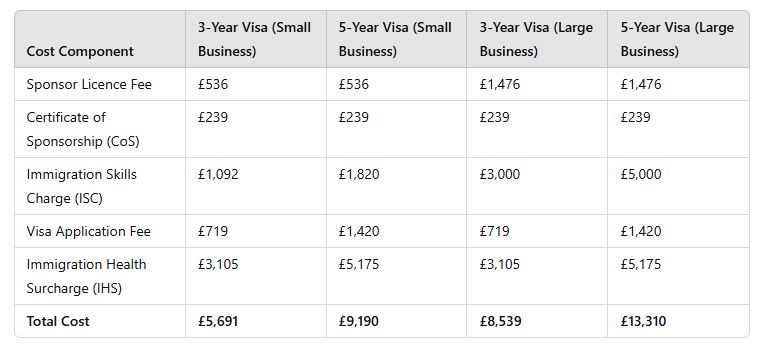- in United States
- with readers working within the Construction & Engineering industries
- within Law Practice Management, Energy and Natural Resources and Corporate/Commercial Law topic(s)
Businesses considering sponsoring an employee in the Skilled Worker visa route should understand the full financial implications of sponsorship prior to making a job offer to a candidate in need of sponsorship.
Costs of sponsorship can be substantial and should be accounted for before a salary offer is made.
This article outlines the associated Home Office costs associated with sponsorship.
1. Sponsorship Licence Costs
To sponsor a worker, a business must obtain a Sponsor Licence from the UK Home Office. The associated costs include:
- Application fee: £536 for small sponsors; £1,476 for medium or large sponsors.
- Compliance costs: Additional administrative resources may be required to maintain accurate records and ensure compliance with Home Office
Your company will be classified as 'small' if it meets any 2 of the following criteria:
- A turnover of £10.2 million or less
- £5.1 million or less on its balance sheet
- 50 employees or less.
The sponsor licence application incurs a one-time fee, whereas the costs for the Certificate of Sponsorship and visa application (detailed below) apply to each employee the business sponsors.
2. Certificate of Sponsorship (CoS) Fees
(a) CoS Assignment Fee
Each sponsored worker requires a Certificate of Sponsorship, costing £239 per certificate. This is a one-time fee per individual application.
(b) Immigration Skills Charge (ISC)
The Immigration Skills Charge is a mandatory levy on businesses sponsoring overseas workers, intended to encourage investment in local skills. The ISC costs:
- £364 per year for small businesses and charities.
- £1,000 per year for medium and large businesses.
This is paid upfront at the time the sponsoring business assigns the certificate of sponsorship. The work period on the CoS will determine the amount paid. For example:
- Sponsoring a skilled worker for three years would cost £1,092 for a small business and £3,000 for a larger business in ISC fees.
- Sponsoring a skilled worker for five years would cost £1,820 for a small business and £5,000 for a larger business in ISC fees.
Note that the Immigration Skills Charge (ISC) is not required in certain cases, such as when the sponsored migrant currently holds a student visa or when the job falls under specific scientific or higher education SOC codes.
3. Visa Application and Immigration Health Surcharge (IHS)
(a) Visa Application Fee
While the visa application fee is typically paid by the worker, some employers may choose to cover it as part of their benefits package.
(i) The standard visa application fees for those applying from outside the UK are:?
- £719 for a visa duration of up to three years.
- £1420 for a visa duration of more than three years.
(ii) For applicants applying from inside the UK, the fees are slightly higher:
- £827 for a visa duration of up to three years.
- £1636 for a visa duration of more than three years.
(iii) If the role falls into an immigration salary list SOC code, the fees are:
- £551 for a visa duration of up to three years.
- £1084 for a visa duration of more than three years.
(iv) If the role is eligible for the Health and Care worker visa subcategory, the fees are:
- £284 for a visa duration of up to three years.
- £551 for a visa duration of more than three years.
(b) Immigration Health Surcharge
Additionally, the Immigration Health Surcharge (IHS) is £1,035 per year and is paid at the time the visa application is made.
Again, the employee, not the sponsoring business, is liable to pay the IHS. Like the ISC, the IHS cost will depend on the work period on the CoS. For example:
- A three-year work period would incur £3,105 in IHS fees at the time of application;
- A five-year work period would incur £5,175 in IHS fees.
Roles that are eligible for the Health and Care worker visa subcategory are exempt from paying the IHS.
Important takeaway: The Home Office strictly forbids businesses from recovering any portion of the expenses related to applying for a sponsor licence (including associated administrative costs such as premium service fees) or issuing a CoS. Breaching this requirement can lead to revocation of the sponsor licence.
4. Total Costs Comparison for a 3-Year vs. 5-Year Visa

Conclusion
Sponsoring a Skilled Worker in the UK is a substantial financial commitment, requiring businesses to factor in substantial Home Off costs. It is also important for sponsors to understand the correlation between costs and the length of sponsorship – you can read our article here for further detail.
Finally, sponsoring businesses must understand that sponsor licence and certificate of sponsorship costs cannot be passed on to the sponsored employee – a breach of this requirement will likely lead to licence revocation.
Sponsoring businesses can also use our cost calculator to determine the exact Home Office sponsorship costs based on their specific circumstances.
The content of this article is intended to provide a general guide to the subject matter. Specialist advice should be sought about your specific circumstances.

